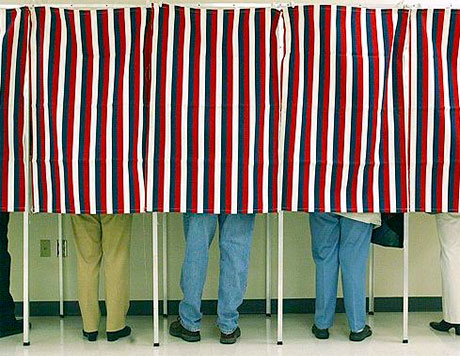Theory #1: Consumer Choice. Here's the claim: how I vote reflects and expresses my identity. I select candidates in the same way I decide how to dress, what kind of car to drive (if any) and how to decorate my living space. And so, if none of the candidates appeal to me, I'll should stay home. In effect, I should refuse to purchase anything. And that's my right.
In a consumerist culture like ours, this way of framing the issue feels like common sense. But on closer examination, it fails. Elections are not about us as individuals, even though we enter the voting booth one at a time. Elections ask us to make a critically informed choice among limited options. Accepting those limitations is the name of the game: politics is the art of the possible.
Voting is not a consumer choice. It's a civic duty, a duty essential to democracy. To vote is to make a down-to-earth critical judgment about a very messy world with complicated problems and limited options. Refusing to do so—insisting upon a politics of purity, as the Tea Party has done—will destroy the democratic process. Problems fester. And that in turn sets the stage for demagogues like Trump who are transparently hostile to the rule of law.
We need pragmatism, not purity: the lesser of two evils is still the better choice. And whether you like her or not, Hillary Clinton is not an actively evil choice. She is by any measure one of the most qualified candidates for president that we have ever seen. And Mr. Trump is one of the most dangerous.
Theory #2: Utilitarianism. Utilitarianism holds that the common good is the sum of individual goods. For electoral utilitarians, voting our own self-interest is simply how the system works. It's what we ought to do. What's right or best for the country—including who should be president—is simply the majority vote of self-interested individuals voting their own self-interest.
Here's how that plays out in the voting booth: if "green" or "libertarian" as labels express my key self-interest, then I'm free to disregard the failings of these particular candidates. I'm not voting for them, because I know they can't win. I'm voting for the label. And that's legitimate; that's the message I want to send. Or if I think that not voting at all "sends a message" of dissatisfaction with the major-party candidates, and that's a message I want to send, then that's legitimate too. That's how the system works. As a result, I can claim that the election outcome is neither my fault or my responsibility. All I can do—what I ought to do—is vote my self-interest.
The problem with this line of analysis is quite a bit more subtle. Democracy is not rooted in voting our own self-interest then tallying the votes. Selfishness exalted to the greatest good remains selfishness. Nothing good comes of that. From time to time we have all belonged to committees or working groups whose members sought only their own self-interest. It's a disaster.
Creative problem-solving in governance demands the ability to look beyond whatever is most gratifying for us as individuals. Self-governance—the core principle of democracy—asks us to figure out which choice among limited options will best serve the nation as a whole. That's the problem we are expected to solve when we vote.
Washington is already full of self-indulgent, posturing politicians. Let's not give in to striking a pose ourselves.
Theory #3: the common good. Democracy presupposes that most citizens are in fact discerning, morally responsible, and compassionate. Democracy assumes that we have the intellectual capacity to recognize the common good and the moral courage to vote for it. If these are mistaken assumptions—if that's all romantic nonsense—then democracy and representative government are doomed.
Each of us has our particular concerns about specific issues. Of course. But when we vote, we place our specific concern into a wider context: which candidate overall has the better moral judgment, experience, diligence, and steadiness of character to serve the common good effectively? We are not nominating anyone for sainthood, after all. And candidates are seldom saints. Our duty is to make the best choice among available options.
In ordinary election cycles, with ordinary candidates, good people will disagree sharply about which candidates and which policies best serve the common good. That is as it should be. But we will solve nothing and serve no one by electing Mr. Trump. Our moral obligation as citizens could not be more stark. He must be defeated. He must be defeated resoundingly.
The challenge before us in this election is to demonstrate yet again that a multi-racial, multi-religious, multi-ethnic people can nonetheless live together with liberty, equality, compassionate respect, and justice for all. Despite our broad and growing diversity, we can work together honestly to solve problems and serve the common good. We have never achieved full measure of these moral ideals. That's obvious. But this ideal is the measure by which we evaluate our political choices. It's the claim we make about who we are in the family of nations.
And by this measure, by this profound and fragile American ideal, how to vote this fall is remarkably clear.

